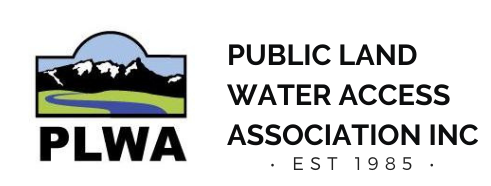
Bridge Access
Bridge Access - An Incredible Legal Asset
While Stream Access Law remained firm after 1985, sometimes the only access point to the water was a bridge on a county road, causing bridges to become the new battleground of stream access.
James Cox Kennedy began purchasing some Madison County land abutting the Ruby River in the 1990s. He restricted the public from entering the river on his ranch property, at three public road bridges across the Ruby River, which had been used for decades by anglers. Fences at the bridge abutments on Duncan Road, Lewis Lane, and Seyler Lane were wired up to keep people from accessing the river, including electric fences.
Bridge access issues in Madison County led the Madison County Attorney, Robert Zenker, and Fish, Wildlife & Park’s Director, Patrick Graham, to write the Montana Attorney General requesting an opinion, “May a member of the recreating public gain access from the right-of-way of a public road at a bridge crossing to a stream or river between the ordinary high-water marks?”
On June 2, 2000, Attorney General Mazurek issued his opinion (48 Op. Att’y Gen. No. 13), which functioned as law until overturned in court or replaced by legislation. Mazurek replied, “Your opinion request evolved through a series of controversies between the recreating public and riparian landowners along the Ruby River in Madison County.” Mazurek confirmed, “Use of a county road right-of-way to gain access to streams and rivers is consistent with and reasonably incidental to the public’s right to travel
on county roads”. He also stated that a bridge and its abutments are part of that public highway, subject to the same public easement for the road and bridge, and access to streams and rivers from county roads and bridges created by prescription is dependent upon the width and uses of the road during the prescriptive period.
James Cox Kennedy’s continued privatization efforts involving bridge access, led PLWA (originally PLAAI) to file a suit against Madison County in 2004, involving the bridges on Duncan Road, Lewis Lane and Seyler Lane. Final portions of that litigation continued up until 2016 involving the Seyler Lane Bridge.
A number of legislative attempts were made to deal with bridge access, none were successful. Then, in 2009, Rep. Kendall Van Dyk from Billings, sponsored the HB 190 Bridge Access Law. The bill opened, “WHEREAS, the Legislature finds that significant controversy has existed related to public access to streams and rivers from county road and bridge rights-of-way; and WHEREAS, a Montana Attorney General’s Opinion in 2000 (48 A.G. Op. 13) held that the use of a county road right-of-way to gain access to streams and rivers is consistent with and reasonably incidental to the public’s right to travel on county roads and that the public may gain access to streams and rivers by using the bridge, its right-of-way, and its abutments;…” HB 190 ended up basically codifying the Mazurek Opinion with some qualifications. It was signed by the Governor and became a law on April 13, 2009.
Information provided in Montana Trout Unlimited Amicus Brief in 2012 stated, “Public road bridges are an important component of the recreational stream access that is integral to the livelihood and way of life of so many Montanans. There are at least 2,014 public road bridges in the state (not including state and federal highway bridges) that cross natural bodies of water… It is common for public road bridges even on minor roads to be used for recreational access.”

